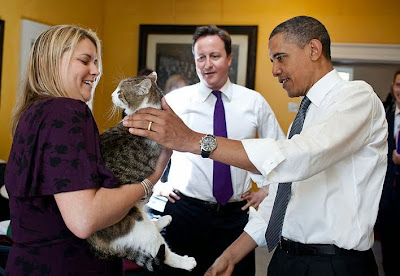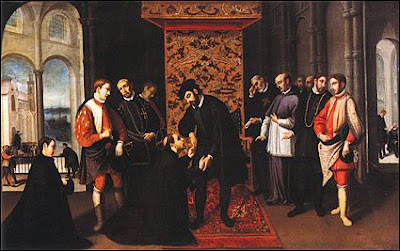Advent Calendar
Bethlehem in Germany,
Glitter on the sloping roofs,
Breadcrumbs on the windowsills,
Candles in the Christmas trees,
Hearths with pairs of empty shoes:
Panels of Nativity
Open paper scenes where doors
Open into other scenes,
Some recounted, some foretold.
Blizzard-sprinkled flakes of gold
Gleam from small interiors,
Picture-boxes in the stars
Open up like cupboard doors
In a cabinet Jesus built.
Southern German villagers,
Peasants in the mica frost,
See the comet streaming down,
Heavenly faces, each alone,
Faces lifted, startled, lost,
As if lightning lit the town.
Sitting in an upstairs window
Patiently the village scholar
Raises his nearsighted face,
Interrupted by the star.
Left and right his hands lie stricken
Useless on his heavy book.
When I lift the paper door
In the ceiling of his study
One canary-angel glimmers,
Flitting in the candelabra,
Peers and quizzes him: Rabbi,
What are the spheres surmounted by?
But his lips are motionless.
Child, what are you asking for?
Look, he gazes past the roofs,
Gazes where the bitter North,
Stretched across the empty place,
Opens door by door by door.
This is childhood's shrunken door.
When I touch the glittering crumbs,
When I cry to be admitted,
No one answers, no one comes.
And the tailor's needle flashes
In midair with thread pulled tight,
Stitching a baptismal gown.
But the gown, the seventh door,
Turns up an interior
Hidden from the tailor's eyes:
Baby presents like the boxes
Angels hold on streets and stairways,
Wooden soldier, wooden sword,
Chocolate coins in crinkled gold,
Hints of something bought and sold,
Hints of murder in the stars.
Baby's gown is sown with glitter
Spread across the tailor's lap.
Up above his painted ceiling
Baby mouse's skeleton
Crumbles in the mouse's trap.
Leaning from the cliff of heaven,
Indicating whom he weeps for,
Joseph lifts his lamp above
The infant like a candle-crown.
Let my fingers touch the silence
Where the infant's father cries.
Give me entrance to the village
From my childhood where the doorways
Open pictures in the skies.
But when all the doors are open,
No one sees that I've returned.
When I cry to be admitted,
No one answers, no one comes.
Clinging to my fingers only
Pain, like glitter bits adhering,
When I touch the shining crumbs.













